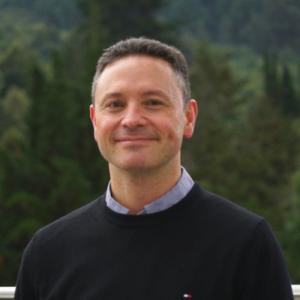Juan Carlos Cruz

Juan Carlos Cruz
Ph.D. in Chemical Engineering, Kansas State University, United States
Trajectory
Research
The multidisciplinary research we are conducting along with Professor Carolina Muñoz focuses on the development and application of new biomaterials for regenerative medicine applications, particularly in the fields of controlled drug delivery, antimicrobial peptide-based systems against resistant microorganisms, and tissue regeneration. Among the areas of interest in controlled release, the production of nano-structured vehicles with cellular penetration capability that respond to the application of external magnetic fields for transport and guidance to target organs and tissues is included. For this, we have received support from the Departments of Chemical Engineering and Electrical and Electronic Engineering at the University of Los Andes. Together with the Chemical Engineering Department, we have worked on the search and production of new biological molecules with spontaneous cellular translocation capabilities, which has enabled us to develop three new cellular penetration vehicles that are also able to escape endosomal intracellular trafficking routes. On the other hand, together with the Electrical and Electronic Engineering Department, we have developed microfluidic platforms to study the transport and encapsulation of the synthesized vehicles. We are currently applying the developed vehicles in the release of small pharmacological molecules (natural and synthetic) and gene therapies for the treatment of neurodegenerative diseases, various types of cancer, and orphan diseases associated with inherited metabolic errors.
In the field of tissue regeneration, we are working on the development of photo-crosslinkable bioinks derived from decellularized extracellular matrices for 3D extrusion-based bioprinting. The work has focused on finding approaches to control the mechanical properties of bioprinted constructs through biochemical modifications that make the materials light-sensitive. With the developed bioinks, we hope to print constructs for applications in the preparation of 3D skin models, as well as regenerate difficult-to-handle tissues such as human hyaline cartilage. Additionally, we have worked on the development of new materials for the manufacturing of hybrid regenerative scaffolds between decellularized extracellular matrices and the 2D electroconductive nanomaterial graphene. This is aimed at accelerating cell proliferation processes in difficult-to-handle wounds, such as those observed in patients with diabetic foot ulcers. Similarly, we are employing this technology, together with Professor Luis H. Reyes from IQUI, for the preparation of gels for the encapsulation of microorganisms intended for the production of commercially relevant metabolites.
Education
Postdoctoral in Engineering
- Johns Hopkins University
- United States
- 2011
PhD in Chemical Engineering
- University of Kansas
- United States
- 2010
Chemical Engineering
- Universidad de Colombia
- Colombia
- 2002
